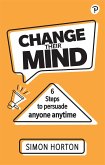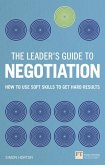Appropriate Courses: Conflict Management and Negotiation.
Becoming an effective negotiator is a universal skill that can benefit all. Unlike other books, Conflict Management explores how to develop this universal skill, using a very individual, personalized approach. Grounded in theory and research, it examines the psychological and sociological factors inherent in the negotiation process. It explores the complexities of negotiations, by looking at how conflict is related and how temperaments and personality traits impact the process. Filled with exercises, self-assessment tools, examples, and cases, the book links theory to practice and gives readers an opportunity to develop, practice, and perfect their own unique set of negotiation skills.
Features + Benefits
Becoming an effective negotiator is a universal skill that can benefit all. Unlike other books, Conflict Management explores how to develop this universal skill, using a very individual, personalized approach. Grounded in theory and research, it examines the psychological and sociological factors inherent in the negotiation process. It explores the complexities of negotiations, by looking at how conflict is related and how temperaments and personality traits impact the process. Filled with exercises, self-assessment tools, examples, and cases, the book links theory to practice and gives readers an opportunity to develop, practice, and perfect their own unique set of negotiation skills.
Explores how personality and temperaments influence negotiation styles and techniques—see ch 2, ch. 5, ch. 19 and throughout the text.
Recognizes the link between personality and conflict management styles.
Provides effective strategies for different personality types and does not rely on just a few prescribed models.
Discusses the psychological and sociological factors—inherent in the negotiation process.
Offers important research and theoretical background to support practical guidelines and suggestions.
Examines the relationship between conflict and negotiation—early in the text.
Shows readers the complexity of both conflict management and negotiation.
Helps readers become more skilled in negotiations by understanding how conflict often begins the negotiation process.
Includes assessment instruments and exercises—throughout the text.
Helps readers identify their own negotiation and conflict management style.
Encourages evaluation and development of one’s own negotiation strategies.
Offers small and large negotiation cases—in Appendix B.
Provides an opportunity to develop skills and apply theory to practice.
Gives instructors flexibility in terms of assignment material and case length.
Provides ample opportunities to develop and try negotiation tactics—throughout the text.
Uses exercises, cases and activities to help readers build their own negotiation skill set.
1. Defining Negotiation and Its Components
2. Personality
3. Conflict
4. Negotiation Style
5. Key Negotiating Temperaments
6. Communicating in Negotiation
7. A Note on Cultural and Gender Differences
8. Interests and Goals in Negotiation
9. Understanding the Importance of Perception in Negotiation
10. Effects of Power in Negotiation
11. Asserting Yourself
12. Principles of Persuasion
13. Rules of Negotiation & Common Mistakes
14. The Negotiation Process and Preparation
15. Alternative Styles, Strategies, & Techniques of Negotiation
16. Team Negotiation
17. Negotiation in Leadership and Public Relations
18. Third-Party Intervention
19. Using Your Personal Negotiating Power
20. Post-Negotiation Evaluation
APPENDIX A: Personality and Behavior Assessment Resources
APPENDIX B: Cases for Negotiation
Appropriate Courses: Conflict Management and Negotiation. Becoming an effective negotiator is a universal skill that can benefit all. Unlike other books, Conflict Management explores how to develop this universal skill, using a very individual, personalized approach. Grounded in theory and research, it examines the psychological and sociological factors inherent in the negotiation process. It explores the complexities of negotiations, by looking at how conflict is related and how temperaments and personality traits impact the process. Filled with exercises, self-assessment tools, examples, and cases, the book links theory to practice and gives readers an opportunity to develop, practice, and perfect their own unique set of negotiation skills.
Hinweis: Dieser Artikel kann nur an eine deutsche Lieferadresse ausgeliefert werden.
Becoming an effective negotiator is a universal skill that can benefit all. Unlike other books, Conflict Management explores how to develop this universal skill, using a very individual, personalized approach. Grounded in theory and research, it examines the psychological and sociological factors inherent in the negotiation process. It explores the complexities of negotiations, by looking at how conflict is related and how temperaments and personality traits impact the process. Filled with exercises, self-assessment tools, examples, and cases, the book links theory to practice and gives readers an opportunity to develop, practice, and perfect their own unique set of negotiation skills.
Features + Benefits
Becoming an effective negotiator is a universal skill that can benefit all. Unlike other books, Conflict Management explores how to develop this universal skill, using a very individual, personalized approach. Grounded in theory and research, it examines the psychological and sociological factors inherent in the negotiation process. It explores the complexities of negotiations, by looking at how conflict is related and how temperaments and personality traits impact the process. Filled with exercises, self-assessment tools, examples, and cases, the book links theory to practice and gives readers an opportunity to develop, practice, and perfect their own unique set of negotiation skills.
Explores how personality and temperaments influence negotiation styles and techniques—see ch 2, ch. 5, ch. 19 and throughout the text.
Recognizes the link between personality and conflict management styles.
Provides effective strategies for different personality types and does not rely on just a few prescribed models.
Discusses the psychological and sociological factors—inherent in the negotiation process.
Offers important research and theoretical background to support practical guidelines and suggestions.
Examines the relationship between conflict and negotiation—early in the text.
Shows readers the complexity of both conflict management and negotiation.
Helps readers become more skilled in negotiations by understanding how conflict often begins the negotiation process.
Includes assessment instruments and exercises—throughout the text.
Helps readers identify their own negotiation and conflict management style.
Encourages evaluation and development of one’s own negotiation strategies.
Offers small and large negotiation cases—in Appendix B.
Provides an opportunity to develop skills and apply theory to practice.
Gives instructors flexibility in terms of assignment material and case length.
Provides ample opportunities to develop and try negotiation tactics—throughout the text.
Uses exercises, cases and activities to help readers build their own negotiation skill set.
1. Defining Negotiation and Its Components
2. Personality
3. Conflict
4. Negotiation Style
5. Key Negotiating Temperaments
6. Communicating in Negotiation
7. A Note on Cultural and Gender Differences
8. Interests and Goals in Negotiation
9. Understanding the Importance of Perception in Negotiation
10. Effects of Power in Negotiation
11. Asserting Yourself
12. Principles of Persuasion
13. Rules of Negotiation & Common Mistakes
14. The Negotiation Process and Preparation
15. Alternative Styles, Strategies, & Techniques of Negotiation
16. Team Negotiation
17. Negotiation in Leadership and Public Relations
18. Third-Party Intervention
19. Using Your Personal Negotiating Power
20. Post-Negotiation Evaluation
APPENDIX A: Personality and Behavior Assessment Resources
APPENDIX B: Cases for Negotiation
Appropriate Courses: Conflict Management and Negotiation. Becoming an effective negotiator is a universal skill that can benefit all. Unlike other books, Conflict Management explores how to develop this universal skill, using a very individual, personalized approach. Grounded in theory and research, it examines the psychological and sociological factors inherent in the negotiation process. It explores the complexities of negotiations, by looking at how conflict is related and how temperaments and personality traits impact the process. Filled with exercises, self-assessment tools, examples, and cases, the book links theory to practice and gives readers an opportunity to develop, practice, and perfect their own unique set of negotiation skills.
Hinweis: Dieser Artikel kann nur an eine deutsche Lieferadresse ausgeliefert werden.








